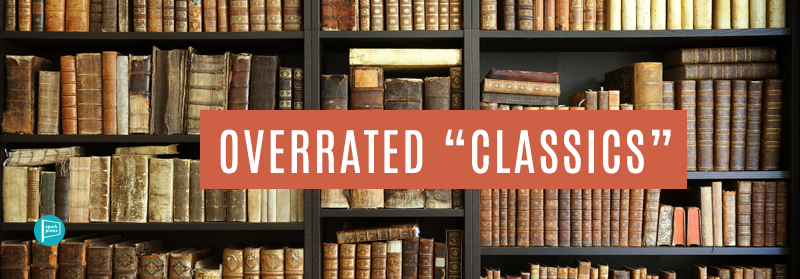
One shared experience that most of us can relate to is when we sat in a high school English class and listened to a teacher declare certain books as “classics.” These books were assigned for us to read and dissect, strictly because of the worth that the world had put on them decades before. While some of these classics are worth reading, their faults are frequently overlooked because of their status and legacy in the literary community. Some books just haven’t translated well over the years. Ultimately, to understand the “classics” is to understand that they are flawed.
Demographic Misrepresentation
Most of the books that are heralded as classic literature are written by white men, and maybe a few white women. Because of that, when it comes to the classics, a lot of demographics are ignored or misrepresented. Even To Kill a Mockingbird, though a story about racism, is told through a very white gaze. While it examines social inequality, it speaks on behalf of the oppressed instead of letting them speak for themselves.
Joseph Conrad’s Heart of Darkness, similarly, is about colonialism, slavery, and the dangers of leaving civilized society—but is all told through the eyes of a white man from England. There are always other points of view we can learn from instead of only holding onto the voices that were prominent sixty to a hundred years ago.
Offensive Material
A good portion of the classics have material that is problematic and sometimes even upsetting. A lot of the classics were written decades ago, if not a century. They have outdated material that would not pass as appropriate in today’s culture.
A lot of them have racist language. Many defenders of the classics have said, “The book accurately reflects the time period it was written in.” We argue that we live in a world with too much ignorance already when it comes to ethnic and racial issues. We do not need to contribute to it by glorifying offensive books without recognizing that they have those major flaws.
Then there’s Lolita—celebrated for its beautiful prose, but is about a man in his thirties obsessing over and sexually abusing the twelve-year-old Dolores. We believe this to be a perfect example of an overrated classic. This isn’t about censorship of tough topics, but about the message. Humbert faces zero consequences for his manipulation of a child—he only goes to prison when he commits murder. Because we are in Humbert’s point of view, we are expected to empathize with him instead of Dolores. Because of that, his “love” for Dolores is never truly identified as abuse. There is no lesson learned, here—in which case, the grand majority of this book is a grown man sexualizing a child, shielding it with pretty prose.
Take the Classics with a Grain of Salt
All of this isn’t to say that readers should stay away from these books entirely, but only that readers should not be disillusioned by them. Because the classics are old, they frequently don’t recognize the flaws in their characters or in the society they’re writing about. Offensive writing is disregarded because of the apparent “value” of the text, but there are a lot of books that are just as well-written as the classics that don’t hide behind their legacy.
The literary community needs to adapt and let go of outdated messages. If something is a classic for a long while, elements of it may not grow with the times. We encourage you to challenge those books—and to seek out titles that can provide the same message in ways that aren’t offensive. Feel free to experience the classics, but keep in mind where they came from. Don’t think of them as gospel.
Some Replacement Books for Your Library
Here are some titles if you’re looking for books that are not overrated! We hope that some of these great books become your new classics.
Instead of To Kill a Mockingbird, read Allegedly by Tiffany D. Jackson
This book is from the point of view of a black woman named Mary who is accused of murdering a white baby. But did she actually do it?
Instead of The Great Gatsby, read A Certain Age by Beatriz Williams
Two women in the navigate romance and scandal in the intoxicating and exciting society of the 1920s.
Instead of Heart of Darkness, read Homecoming by Yaa Gyasi
Following two black sisters and their descendants over eight generations, this book takes a look at the legacy of slavery in America.
Instead of Gone with the Wind, read Jubilee by Margaret Walker
This is an #ownvoices story about Vyry, a mixed-race child growing up in the Civil War-era South, fighting her way toward a better future.

Leave A Comment